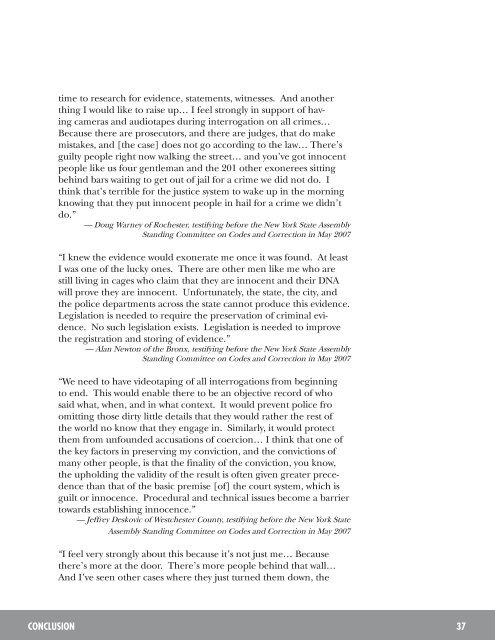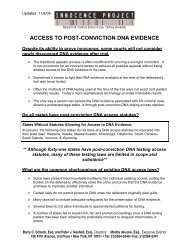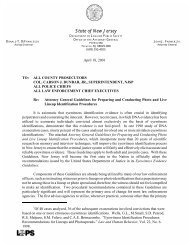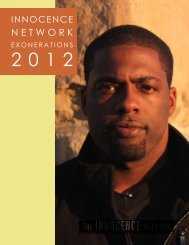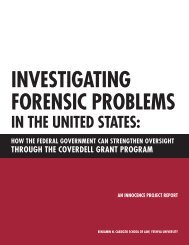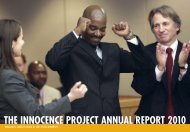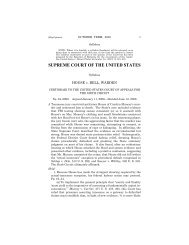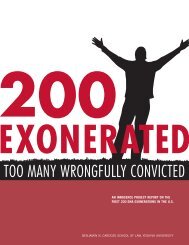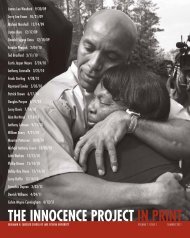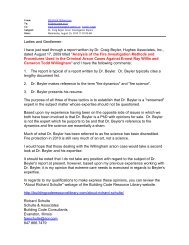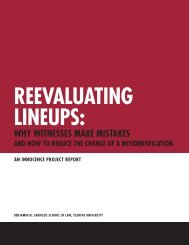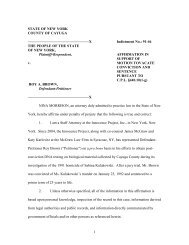Lessons Not Learned - The Innocence Project
Lessons Not Learned - The Innocence Project
Lessons Not Learned - The Innocence Project
Create successful ePaper yourself
Turn your PDF publications into a flip-book with our unique Google optimized e-Paper software.
ConCLUsIon<br />
time to research for evidence, statements, witnesses. And another<br />
thing I would like to raise up… I feel strongly in support of having<br />
cameras and audiotapes during interrogation on all crimes…<br />
Because there are prosecutors, and there are judges, that do make<br />
mistakes, and [the case] does not go according to the law… <strong>The</strong>re’s<br />
guilty people right now walking the street… and you’ve got innocent<br />
people like us four gentleman and the 201 other exonerees sitting<br />
behind bars waiting to get out of jail for a crime we did not do. I<br />
think that’s terrible for the justice system to wake up in the morning<br />
knowing that they put innocent people in hail for a crime we didn’t<br />
do.”<br />
— Doug Warney of Rochester, testifying before the New York State Assembly<br />
Standing Committee on Codes and Correction in May 2007<br />
“I knew the evidence would exonerate me once it was found. At least<br />
I was one of the lucky ones. <strong>The</strong>re are other men like me who are<br />
still living in cages who claim that they are innocent and their DNA<br />
will prove they are innocent. Unfortunately, the state, the city, and<br />
the police departments across the state cannot produce this evidence.<br />
Legislation is needed to require the preservation of criminal evidence.<br />
No such legislation exists. Legislation is needed to improve<br />
the registration and storing of evidence.”<br />
— Alan Newton of the Bronx, testifying before the New York State Assembly<br />
Standing Committee on Codes and Correction in May 2007<br />
“We need to have videotaping of all interrogations from beginning<br />
to end. This would enable there to be an objective record of who<br />
said what, when, and in what context. It would prevent police fro<br />
omitting those dirty little details that they would rather the rest of<br />
the world no know that they engage in. Similarly, it would protect<br />
them from unfounded accusations of coercion… I think that one of<br />
the key factors in preserving my conviction, and the convictions of<br />
many other people, is that the finality of the conviction, you know,<br />
the upholding the validity of the result is often given greater precedence<br />
than that of the basic premise [of] the court system, which is<br />
guilt or innocence. Procedural and technical issues become a barrier<br />
towards establishing innocence.”<br />
— Jeffrey Deskovic of Westchester County, testifying before the New York State<br />
Assembly Standing Committee on Codes and Correction in May 2007<br />
“I feel very strongly about this because it’s not just me… Because<br />
there’s more at the door. <strong>The</strong>re’s more people behind that wall…<br />
And I’ve seen other cases where they just turned them down, the<br />
37


